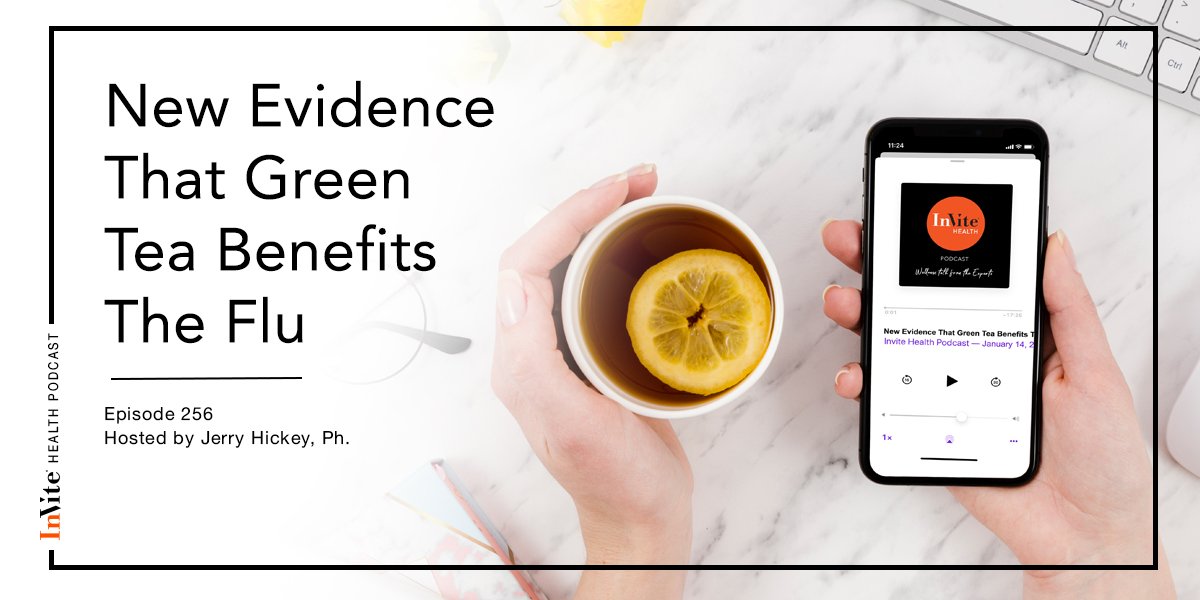New Evidence That Green Tea Benefits The Flu – InVite Health Podcast, Episode 256

green tea
Invite Health Podcast, Episode hosted by Jerry Hickey. Ph
Subscribe Today!
For many decades, research has been published in valid medical journals about how green tea cuts the incidence of fevers, upper respiratory tract infections and cold and flu infections. The data is pretty strong. Research showed that children who lived in precincts in Japan where they grow green tea and drank green tea had far fewer fevers and sore throats than children who did not. In a different study, children who drank green tea had far fewer flu infections as diagnosed by a medical doctor or pediatrician compared to children who did not drink green tea. The more tea they drank to a degree, the better the protection. We’re talking small cups here, we’re not talking an 8-ounce sized cup.†
The data on green tea continues to grow in reference to upper respiratory tract infections, fevers, sore throats and specific viruses, especially cold viruses and flu viruses.†
New data
The latest study is from November 2, 2020. It’s from the Department of Food and Health Sciences at Fukuoka Women’s University in Japan and the National Center for Global Health and Medicine in Tokyo, Japan. The researchers were looking at influenza among workers in Japan in the Kanto and Toki areas. They looked at 4,302 workers and they looked at their frequency of consumption of tea and the frequency of physician-diagnosed flu that occurred over the winter season from November through April from 2011 to 2012. They write, “Green tea consumption was significantly associated with decreased odds of developing influenza.” Adjusted odds ratio for green tea consumption of greater than five cups per week, so you didn’t even have to drink it every day, reduced your risk by 39%. That’s versus less than one cup a week. They go on to say, “Our data suggests that green tea consumption is associated with a lower risk of influenza.”†
The Japanese health authorities recommend rinsing your mouth out with water twice a day to cut your risk of a sore throat, a cold or the flu and it works. There’s a big decrease in the incidence of infections when you rinse your mouth with water twice a day. In many studies, when they added green tea to that, it was twice as effective. There was 50 to 60% reduced incidence of the flu. If you did get sick, it wasn’t as violent or as dangerous. It was a much milder infection. It was a shorter duration and weaker symptoms. So there really is something to tea and the flu.†
Some tips for consuming green tea
If you’re going to get green tea, make sure it’s organic. Mosquitoes grow in these rainy areas where they have the green tea plantations, and with mosquitoes, comes malaria. To prevent malaria and to reduce the population of these mosquitoes, they commonly spray with DDT, which is a very toxic pesticide. It has a 50-year half life and it tends to go into tissues like women’s breasts, so if a woman drinks green tea with DDT in it today, half of that DDT will still be there in 50 years. If she’s having green tea every day, twice a day for years, that DDT is building up. When we make our supplements, we use green tea that has never been sprayed, is non-GMO and has never been irradiated. You want to use clean stuff.†
Green tea targets inflammation and more – InVite Health Podcast, Episode 245. Listen Now >>
If you get decaffeinated green tea, it could wash the good things that are protective for the flu out of the tea. The caffeine is water-soluble and the catechins, especially one called EGCG, that are powerful protectors from infections, are also water-soluble, so when they remove caffeine, they also remove these polyphenols called catechins. If you get a tea that’s decaffeinated, you want to make sure they put those catechins back in so it’ll be standardized to a certain potency of catechins per tea bag.†
Never put milk in your green tea. It seems to bind up the active ingredients. You want to put lemon in there for several reasons. Lemon protects the green tea from your digestive enzymes and you get more tea intact. You get these powerful, beneficial catechins intact.†
Listen to the full podcast episode to learn more about the powerful benefits of green tea.
Thank you for tuning in to the Invite Health Podcast. You can find all of our episodes for free wherever you listen to podcasts or by visiting www.invitehealth.com/podcast. Make sure you subscribe and leave us a review! Follow us on Facebook, Twitter and Instagram at Invite Health today. We’ll see you next time on another episode of the Invite Health Podcast.


